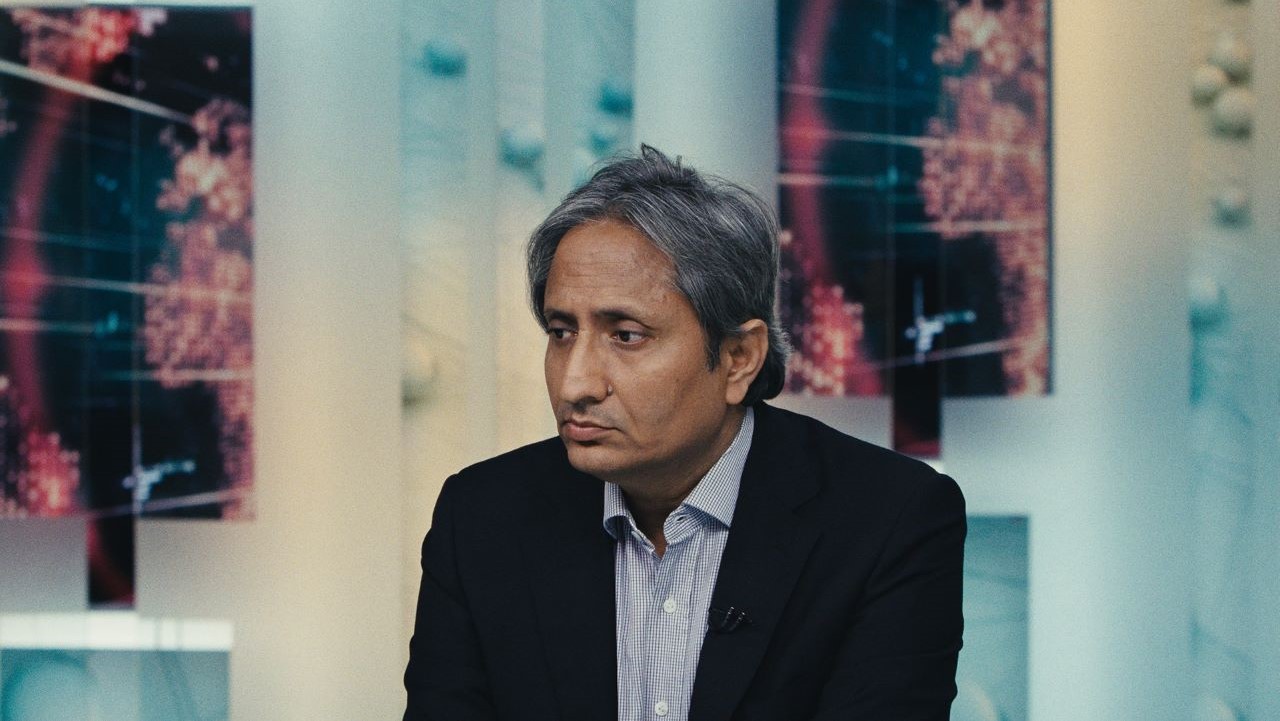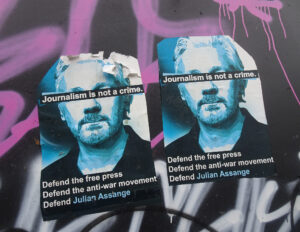Modi’s War on the Media
The urgent Indian documentary “While We Watched” captures journalism under fire. Former news anchor Ravish Kumar. (Photo: BRITDOC Films)
Former news anchor Ravish Kumar. (Photo: BRITDOC Films)
Between 2012 and his resignation in 2022, news anchor Ravish Kumar and his nightly primetime greeting, “Namaskar, mein Ravish Kumar” (“Good evening, I’m Ravish Kumar”) was a staple of Indian news media. As the host of the topical talk show Hum Log — which loosely translates to “We the people” — on the national news network NDTV, Kumar embodied an approach to news that is now under threat from India’s right-wing government. How the media landscape has been twisted and contorted to support nationalistic sentiment bolstered by religious zealotry is the subject of “While We Watched,” Vinay Shukla’s urgent and precise chronicle of what demanding accountability looks like (and what it costs) in the world’s largest democracy.
For most of its 94 minutes, “While We Watched” depicts Kumar’s personal and professional life between the Indian general elections of 2014 and 2019, both won by Prime Minister Narendra Modi. The film opens with its only nonlinear flourish: a haunting image of Kumar walking through the ruins of a high-tech news room, which appears to have been dismantled with intent. While the context of this image is clarified by the closing credits, this initial appearance brings to mind the right-wing violence wrought upon Indian journalists over the years that has been on the rise under the Modi government: from raids on India’s BBC offices; to public assaults on Kumar’s own NDTV colleagues; to the murder of outspoken print reporter Gauri Lankesh.
For the celebrated news anchor, an average day involves work, family and fielding dozens (if not hundreds) of threatening phone calls from BJP fanatics.
These individual threads, some of which the movie mentions in passing, form the larger tapestry against which Kumar’s story unfolds. Shukla quickly takes the national temperature using viral clips of religiously motivated lynchings, which have increasingly targeted Muslims on flimsy suspicions of beef-eating, and stories of student activists like Umar Khalid, who narrowly escaped a political assassination with similar motives. These are contextualized through Kumar’s reporting, as well as through on-air snippets of competing anchors on other news channels — chief among them, The Republic’s boisterous mascot Arnab Goswamy, known for his chaotic and cacophonous debates — reflecting the chilling reality of contemporary Indian journalism. Where Kumar questions the fear-mongering, Islamophobic credo of the Modi government, others like Goswamy not only sing its praises, but parrot its propaganda by branding Kumar and other political rivals with charged labels meant to quash dissent, and cast them as threats to national security: “communist,” “anti-national,” “urban naxal” and the ever-reliable greatest hit, “Pakistani.” Just days ago, a uniformed policeman killed three Muslim passengers aboard a train bound for Mumbai while invoking Modi’s name, and accusing the deceased of “operating from Pakistan.”
Nearly all these aforementioned phrases appear in the film’s opening minutes, an extended montage aimed at establishing its political outlook so there’s never any confusion about where it stands. A nuance-less doctrine like Hindutva — the literally Nazi-inspired Hindu supremacist ideology of the BJP, India’s ruling party — often demands an equally didactic rebuke, given its flagrant dehumanization of Muslims and other minorities. However, the film that unfolds beyond these initial scenes is a surprising and propulsive look at the dimensions and inner workings of Kumar’s NDTV newsroom, and the vulnerable, multifaceted individual behind the steady on-screen persona.
Shukla and his camera are granted intimate access to Kumar’s life. For the celebrated news anchor, an average day involves work, family and fielding dozens (if not hundreds) of threatening phone calls from BJP fanatics. He picks up, responds and even plays little games with the callers; it’s hard not to wonder if he’s either addicted to the attention, or trying to exert some kind of control as the ground beneath his job grows increasingly shaky. In the newsroom, discussions about the evening’s stories are as common as those about falling ratings and threats of censorship. At one point, an instance of the latter is even captured in real time, as NDTV is mysteriously kicked off the air in numerous cities right as Kumar begins questioning government narratives — a scene that plays out with the momentum of a fictional thriller, thanks to Shukla’s deft melding of realistic subject matter with an aesthetic approach usually reserved for dramatic fiction.
In an era where mainstream film industries like Bollywood rub shoulders with the BJP, weaponizing its populist sentiments, it often falls on documentary filmmakers to portray political realities in ways fiction refuses to. This has resulted in a groundswell of contemporary documentary and docu-fictional works that eschew the genre’s traditional talking-head interview format, in favor of a hybrid artistic approach that captures reality through fiction-esque presentation. Shaunak Sen’s Oscar-nominated avian conservation film “All That Breathes” employed the blocking and framing of traditional drama when presenting Muslim veterinarians — an aesthetic approach shared by Sarvnik Kaur’s “Against the Tide,” which chronicles a fishing community’s battle against climate change and government negligence. Another notable documentary, Payal Kapadia’s “A Night of Knowing Nothing,” chose a more avant-garde depiction of student protests; it forms the perfect mirror to “While We Watched,” since it takes a wildly different visual approach to similar subject matter (and in some cases, the very same events). Where Kapadia’s film is dreamlike and esoteric, Shukla’s offers an enrapturing, cinéma verité realism in the vein of Paul Greengrass (“United 93”), assisted by an unsettling musical score from Joaquin Garcia. It isn’t just a thrilling documentary, but a documentary thriller.
Kumar would eventually resign in tandem with NDTV’s founders — who also drew the government’s ire, as seen in the film — after the channel was acquired by an oligarch with ties to Narendra Modi.
The typical presentation of TV news anchors — head on, center-framed, flatly lit — is a convention aimed at audience comfort and subconscious notions of “objectivity,” but Shukla bucks this tradition with aplomb. His camera often runs in tandem with that of the NDTV news crew, so “While We Watched” captures Kumar reading the very same news copy he read on the air. However, the film’s visual departures imbue even the comforting and image of a familiar anchor with an eerie subtext, as if something were amiss beneath an otherwise unassuming surface. Long, voyeuristic lenses peer in on silent moments of contemplation that never made it to broadcast. The saturated colors and heightened visual contrast create a shadowy look. It appears more serious — more traditionally “cinematic” — than your average nightly news show, courtesy of Shukla and co-cinematographer Amaan Shaikh. In the process, the news itself becomes part of the aesthetic continuum the film creates behind the scenes, with its unstable hand-held camera peering in on meetings, and following producers as they rush urgently from room to room.
There are quiet moments too, moments of piercing subtlety amidst the sweeping newsroom energy. Kumar loves spending time with his elementary school-aged daughter, but showing her fun videos on his cell phone also involves disconnecting numerous threatening phone calls every couple of seconds — a striking reminder of how being branded “anti-national” paints so large a target on a person’s back as to rob them of life’s little joys. The film features numerous shots of Black Forest cake, a go-to flavor in Indian households and workplaces; the cake initially appears in the newsroom during routine celebrations, like birthdays and anniversaries. But as time goes on, the delicacy begins to mark the departures of various producers and journalists from NDTV. One by one, Kumar’s professional circle is broken by the pressures of boycotts and violent threats. Little by little, even a celebratory dessert becomes bitter.
The more pressure Kumar comes under, the more unsavory some of his interactions begin to feel. Some are even petty and vengeful, against former critics who eventually beg him to cover their governmental woes on air. However, these vivid dimensions are all part and parcel of the movie’s overarching thesis: that Indian journalists needn’t be saints in order to deserve constitutional rights, or even careers in journalism. Unfortunately, these have become negotiable in modern India. A jingoistic platform is practically a prerequisite for basic safety. For many, compromise is the only option.
Kumar would eventually resign in tandem with NDTV’s founders — who also drew the government’s ire, as seen in the film — after the channel was acquired by an oligarch with ties to Narendra Modi. Shukla’s timeline doesn’t extend to include these events — “While We Watched” had already premiered in Toronto by the time they unfolded — but his conclusion is eerily open-ended, as if the story he is telling weren’t Kumar’s alone, but belonged to all those shouldering the burden of Indian journalism. For those like Kumar, who refuse to bend to the whims of an authoritarian government, the walls keep closing in, a feeling the movie re-creates in its final frames, which feel like being left in suspended animation.
A moving ode to journalism, “While We Watched” does more than depict media complicity in a country’s plummet into fascist violence. It re-creates the sensation of this descent, while painting a vivid portrait of someone with the nerve to question it.
Your support matters…Independent journalism is under threat and overshadowed by heavily funded mainstream media.
You can help level the playing field. Become a member.
Your tax-deductible contribution keeps us digging beneath the headlines to give you thought-provoking, investigative reporting and analysis that unearths what's really happening- without compromise.
Give today to support our courageous, independent journalists.






You need to be a supporter to comment.
There are currently no responses to this article.
Be the first to respond.